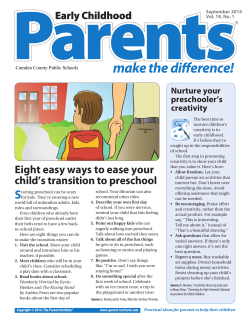
T N C
THE IMPACT OF NARCOLEPSY ON CHILDREN Ed Coates Vice Chair Narcolepsy UK DECLARATION A parent of a (now) 18 year old daughter who was diagnosed with Narcolepsy and Cataplexy at age 11 (during year 7) I am a Children’s Social Care Manager working with Children in Need of Protection, Children in Care and Children with Disabilities All medical comments are of a general nature and therefore you should consult your medical advisers regarding treatments 2 THE IMPACT OF NARCOLEPSY ON CHILDREN; THIS PRESENTATION Who this is for…. Some reality checks : (what Narcolepsy is ….and what it isn’t)..I explain the symptoms. ….and the true impact…particularly the relevance of emotional and other “non medical issues” Discuss the management of the condition & what helps Discuss Parents roles “Working together”/teams/ & support Raise some other themes, further ideas/work/research questions/discussion throughout 3 WHAT IS NARCOLEPSY? Narcolepsy is a Neurological Condition causing a sleep disorder which affects the brains’ ability to regulate the normal sleep-wake cycle. This can lead to symptoms such as disturbed night-time sleep and excessive sleepiness throughout the day. It is often, although not always accompanied by a condition called Cataplexy 4 WHAT IS NARCOLEPSY? Normal sleep is organised into a regular pattern of REM (Rapid Eye Movement) and non-REM stages. Every 90 minutes or so, a normal sleeper experiences several minutes of REM sleep where dreaming occurs before switching back to non-REM sleep. In most sufferers however, the nocturnal sleep pattern is much more fragmented and they typically experience numerous awakenings. REM sleep can occur very quickly during the night or day, producing unusual phenomena such as hallucinations. 5 WHAT IT IS NOT! It isn’t just a bit of tiredness/sleepiness…or laziness bad temper a psychological condition lack of intelligence deliberate easily controllable 6 UNDERSTANDING NARCOLEPSY - SYMPTOMS The Tetrad of symptoms: Irresistible sleep attacks Cataplexy Hypnogogic hallucinations Sleep Paralysis Plus: Extreme emotional responses and behaviours 7 UNDERSTANDING NARCOLEPSY – WHAT THIS REALLY MEANS Irresistible sleep attacks …”as if you had been awake for 48 hours without any sleep” – frequent and not predictable Cataplexy….” you can’t laugh, cry, get angry get upset without risking looking stupid or collapsing or …worse still completely losing control + all of these” REM sleep and Hypnogogic hallucinations ….”realistic , sometimes terrifying…and I mean terrifying real life dreams in which you see and feel everything”…..”I had a maggot eating my brain from the inside” Sleep Paralysis…..being asleep but aware , but totally unable to move In short – it really does have a massive impact 8 UNDERSTANDING NARCOLEPSY - IMPACTS: Educational Performance Behaviours (aggression, incl outbursts/violence) Emotions and feelings: upset/anger/confusion/failure/sense of loss…&etc) Social Relationships Self Esteem Activities/ hobbies/ sports & future employment 9 UNDERSTANDING NARCOLEPSY IMPACTS: Family and relationships…can lead to breakdown, and “care” Misunderstandings and labels: (lazy/aggressive/useless/unintelligent/disabled/ uncooperative….&etc) Driving 10 UNDERSTANDING NARCOLEPSY – IN CHILDREN The Performance and Behaviour graphs ..… …… a personal description based experience and through conversations with numerous parents. It gets better….but only if we do get the right help 11 THE PERFORMANCE GRAPH… …OR EMOTIONAL JOURNEY Performance/Time 5 4.5 4 3.5 3 2.5 2 1.5 1 0.5 0 Performance/Time 12 THE CRISIS TIME episodes/outbursts 6 5 4 3 Episodes/outbursts 2 1 0 11 12 13 14 15 16 17 13 UNDERSTANDING NARCOLEPSY – IN CHILDREN It gets better Little research/ little is known about the emotional journey for Children The early years are the most dramatic with major behaviours often including the most dramatic and uncontrollable rages against self and loved ones. This can include serious self harm and sometimes attempts to die. …and it isn’t a psychological condition it is a neurological spectrum disorder This may be an area that families and the child themselves needs the most help 14 WHAT HELPED? Resilience Factors: family. timing…we already knew her character/abilities etc. support …esp. an Occupational therapist at school medication…esp. Xyrem understanding/determination/knowledge meeting others Narcolepsy UK 15 NARCOLEPSY MANAGEMENT The aims of treatment Normalise life as far as possible Make work and education possible Make driving possible 16 NARCOLEPSY MANAGEMENT Life style changes Accept condition – not fight – understand it Control emotions Review educational & career aims Prophylactic naps Diet (avoid carbohydrates) Bedroom safety Drugs Narcolepsy : The balance between staying awake (daytime) and good sleep at night. & Treatment for Cataplexy 17 NARCOLEPSY MANAGEMENT Understanding/ not criticism or blame Practical solutions with emotional support (not all solutions are welcome as they intrude on the normal!) Sleep Hygiene and routines Daytime Naps Sleep is a treatment for sleepiness Nap before vigilant periods Employer/school co-operation Prophylactic NOT recovery Short (10-20) minutes Stimulant boost before nap A nap is treatment not surrender! 18 NARCOLEPSY MANAGEMENT : WORKING TOGETHER Carers, Teachers, Medics, CAMHS, Psychologists …& etc need to! Typically agencies will think in terms of their own specialism….but they also need to think what does Narcolepsy mean for this young person in the context of their involvement Collective views and plans around the child are needed …..because Narcolepsy and Cataplexy will have profound effects on this young person 19 NARCOLEPSY MANAGEMENT WORKING TOGETHER Most children need a “Champion” to help bring people together. That can be you, but you may need help! …..and the plan will need the young person to buy in to it …..(and they may resist for a variety of reasons). And they…we all need…. 20 A LITTLE BIT OF LOVE!! 21 NARCOLEPSY MANAGEMENT ; MEDICAL TREATMENT Excessive sleepiness Stimulants (amphetamines, modafinil) Sodium oxybate/ Xyrem Caffeine Widely available (tabs, coffee, drinks) Short acting, tolerance, diuresis Naps Cataplexy Antidepressants (clomipramine, venlafaxine) Sodium oxybate/ Xyrem 22 NARCOLEPSY TREATMENT You must get follow-up – the diagnosis is just the start Have a holistic approach not just a medical one All people with narcolepsy should be under the care of a specialist sleep service have the opportunity for annual follow-up receive support with school or workplace with education and employment difficulties have the opportunity to meet with and give and receive support from other patients 23 WHAT NEXT…WHAT IS NEEDED?...SOME IDEAS… More research on the (different) impacts of Narcolepsy and Cataplexy on children, on people with Narcolepsy generally, and on their wider family. Development of support systems for sufferers and their families. Consideration of whether we should be pressing for additional services from “Social Care” or Children’s services/CAMHS as Children in Need. Education…for the educators/medical professionals/ psychological services and not just on the medical/diagnosis issues 24 SUPPORT IN EDUCATION Understanding the condition (teaching the teachers) Use the materials available (from NUK) Naps Choices of subject Encouraging success Valuing Managing behaviours Medication Exams and adjustments to assessments Support in class ………& etc 25 A WEEK IN SCHOOL 26 THANK YOU……AND …ANY QUESTIONS 27
© Copyright 2025





















